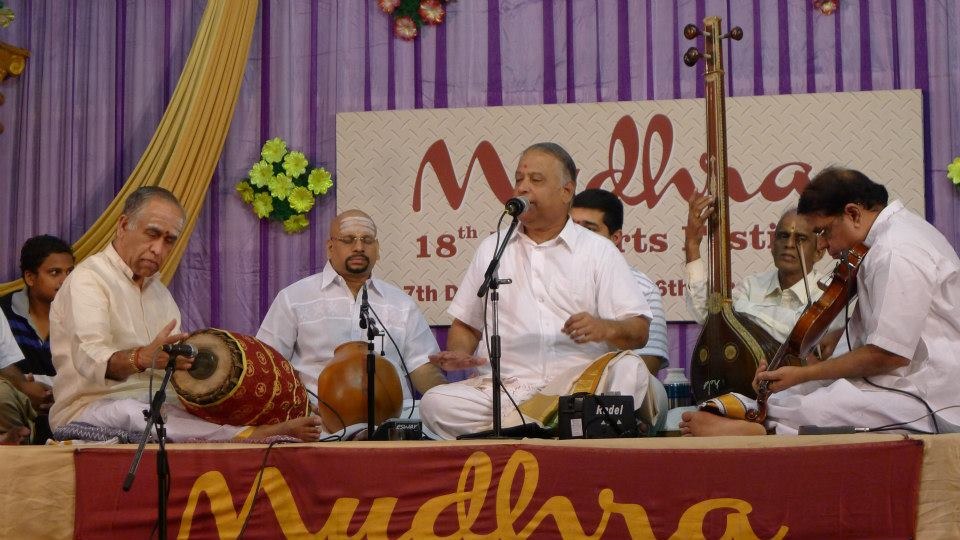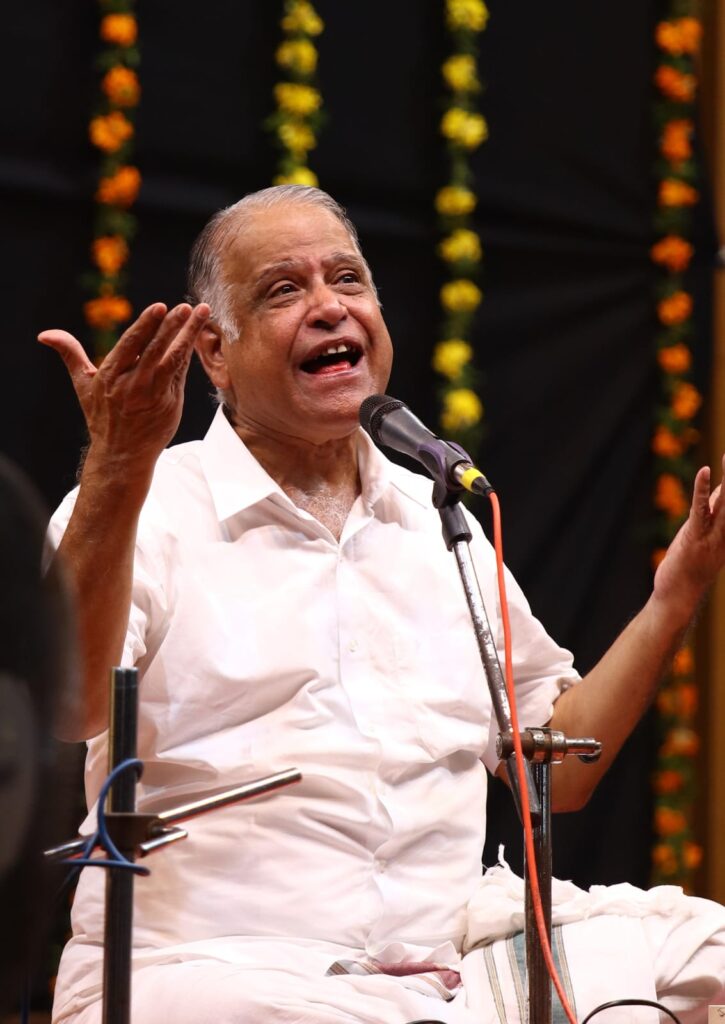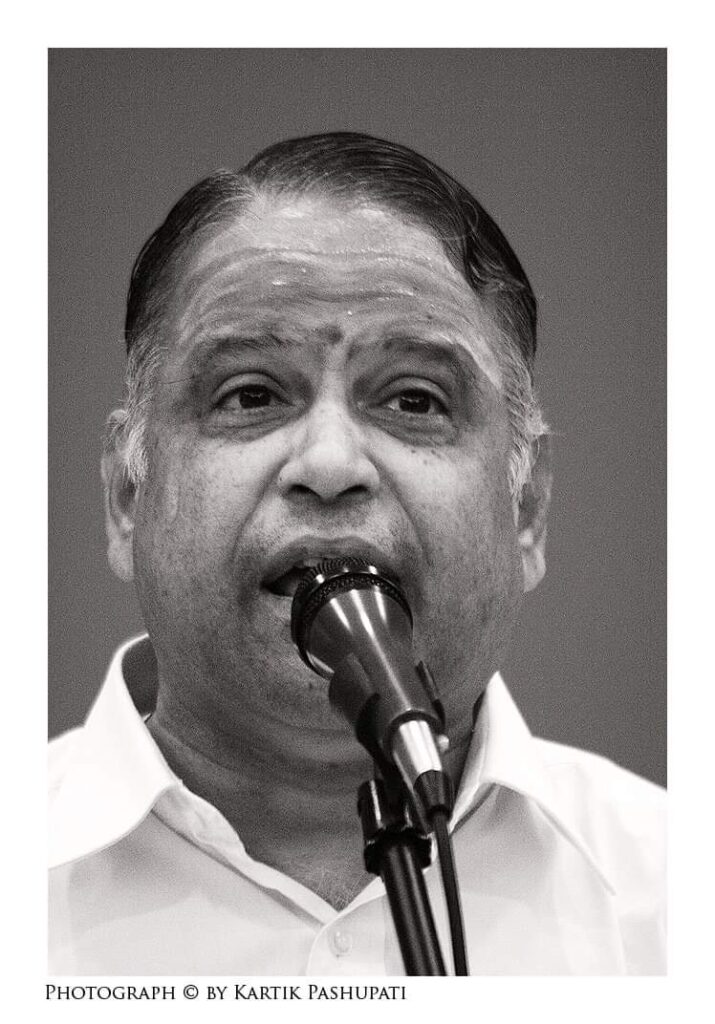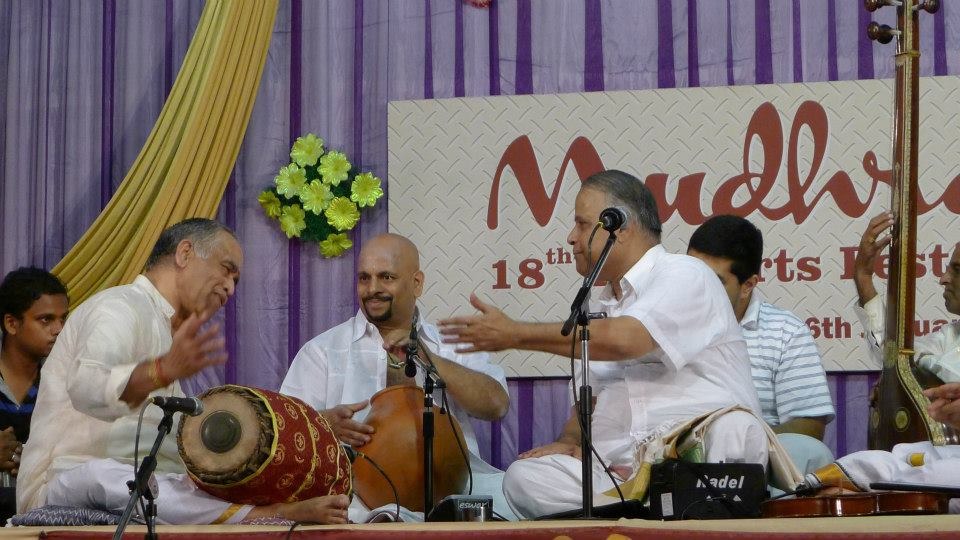O.S. Thiagarajan – A Tribute
My Guru, Sri. O.S. Thiagarajan (OST), passed away on December 31st. When I started lessons with him, I was a young child, completely unaware of (and uninterested in) his musical skills or pedigree. The first piece he taught was Muthuswamy Dikshitar’s MahA GaNapate in NaTanArAyaNi – he was kind and patient and I remember my grandmother being relieved. It was two to three classes a week after that, where he would come by bus to our small flat in Besant Nagar directly from a full day’s work at Shalimar Paints, before heading back to his home then in Kodambakkam.
This piece appeared in The Hindu dated January 4th/5th, 2024. Though the goal is to write unemotionally, it was not possible in this case. This is a very personal one.

He was peaking in his career at that time and extremely popular, receiving awards from The Music Academy and other sabhas constantly. He made everything he sang seem so complete a cakewalk that I was convinced the artform itself was an easy one! I remember one program where he sang Narayana Tirtar’s Govinda gaTaya in Bhairavi and SAma gAna priyakaram, a Swami Surajananda piece in KeeravANi. I was so taken by these renditions that I requested him to teach both to me. He acceded immediately. Years later, I realised that he could have easily (and very rightfully) said that I was not ready for a more complex rAgam like Bhairavi – I had barely learned some 10 kritis. He taught any piece I ever requested unhesitatingly including in VarALi (his Kaa Vaa Vaa made this rAgam a lifetime firm favourite) which traditionally was not taught.
It was only after moving to the US, during practice sessions with erudite aficionados, that I realised what an enviable corpus of pieces he had imparted – many were magnum opuses and/or in nuanced/rare rAgams like Yadukula KAmbhOji, UrmikA, MadhyamarAvaLi, KedAram etc. He never told me they were tricky rAgams. Neither did he say that KIravANi and GaurimanOhari or DevagAndhAri and Arabhi or PUrNachandrika and Janaranjani or SuraTi and KedAragowlai were closely allied, though he taught me compositions in all these rAgams. It was incredibly wise of him – it would have made me too self-conscious. Instead, he taught it like any other piece and ensured that I sang each one correctly– the rAga swarUpam was thus automatically maintained. He was unfailingly positive – when I could not reproduce some intricacies and felt low, he would insist that I would get it over time, and he was able to sing it only because he was older and had many more years of practice.

Photo by Sri. Ramanathan Iyer
His fidelity to sruti was awe-inspiring– veteran violinist TKV Ramanujacharlu, with 40 years of association, says, “He had a sruti suddhamaana tambura inside his voice.” I have heard him hold notes at all stAyis for 1.5 to 2 Avartanam-s of 2 kaLai Adi tALam numerous times, without even the hint of a tremor – the transition following it would be the silkiest and gentlest glide. Absolutely routine for him and executed with consummate ease, it gave me goosebumps and unfailingly excited audiences. He modulated his voice enviably, neither shouting nor crooning. He could render any brigA or gamakam with the same felicity as a long stationary note, both combined in perfect balance.
His kriti rendition followed the Semmangudi Srinivasa Iyer style for the most part, but the ease with which he sang was reminiscent of KV Narayanaswamy. The most senior and storied violinists and percussionists accompanied him but he was also extremely encouraging of juniors. Several youngsters listed him as a senior musician they had played for, and he was a sought-after vocalist for arangeTram-s. He was very articulate in English and it was an absolute pleasure to hear his excellent Tamizh. He had a fondness for Telugu and for Thyagaraja kriti-s in particular – performing many concerts of only Thyagaraja kriti-s later in his career.

He never asked me to attend his concerts. If and when I did, he would ask for my opinion. An outspoken kid with no filters, I did not spare him or his co-artistes. He never criticised anyone, though – to my vociferous statements, he would smilingly respond with “He/she is just starting out” or “they are rather old now” or “people have bad days sometimes”. When he taught me Sarasa sAma dAna in KApinArAyaNi, and came to the line ‘hitavu mATalento’, I categorically proclaimed “That is wrong,” Madurai Mani Iyer’s (MMI) cassette tape having convinced me that there were not that many syllables in that line. Smilingly, he said that MMI’s voice might have made it sound that way but those were, in fact, the words.
Despite my father clearly informing him that I would never compete or perform, he spared no effort. He took me on stage to sing along with him and I did so at many concerts where he was often asked if I was his daughter, thrilling me to bits. His three daughters, Archana, Aparna and Bhavani were very musically talented, but he never used his stature to promote them. Their fellow competitors at music competitions remember that Sir never attended, and his wife Vaidehi mAmi, his backbone of support throughout, would remain out of sight.
He taught me a very simple piece once, saying he learned it from a 7-year-old who sang it at his home the previous evening, telling me that one should learn good things from everyone regardless of age. He lived very simply and took joy in the small pleasures of life – enjoying chinna vengAya sambAr and potato roast and remembering the smallest things about people. I remain amazed at the freedom I had under his care. It is an immense personal loss.

Lakshmi Anand writes with such clarity and substance that her posts are memorable. Straight from the heart and with a keen sense of perception coupled with an ability to express the exact thoughts in prose, her statements are special. Her writings are as full of value as they are pleasurable to read.
Thank you so much for the extremely kind words. I hope I can live up to them.
OST sir’s untimely demise was heartbreaking. A true loss to carnatic music world. Thank you for capturing the essence of his personality based on your close association with him as a student. As mentioned in the article, ease and clarity were perhaps the hallmarks of his scholarly music.
You are blessed to have learnt music from such a wonderful artist 🙏🏻🙏🏻
Thank you for your kind words. I am truly grateful for the completely unconditional teaching he imparted – with so much affection and encouragement.